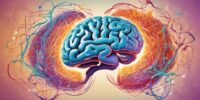The Integrative Guide to Good Health by Brent A. Bauer, Cindy K. Dove – Summary and Review

This book covers a wide range of topics including nutrition, exercise, stress management, and alternative therapies. It emphasizes the importance of treating the whole person – body, mind, and spirit – to achieve balance and wellness.
Readers will find practical tips, evidence-based information, and personal stories that inspire and empower them to take charge of their health and make positive lifestyle changes.
Key Takeaways
- Daily wellness practices nurture vitality and balance.
- Mind, body, and spirit connection is vital for holistic health.
- Integrative therapies promote profound healing and well-being.
- Essential eating, life force healing, and complete lifestyle enhance overall wellness.
Authors' Backgrounds
With an impressive blend of academic expertise and practical experience, the authors of the Integrative Guide to Good Health bring a wealth of knowledge to their work. Brent A. Bauer, renowned for his extensive research in integrative medicine, holds a Doctor of Medicine degree from the University of California, San Francisco. His credentials include being the Director of the Mayo Clinic Complementary and Integrative Medicine Program. Bauer's commitment to bridging conventional and alternative medicine is evident in his numerous publications and speaking engagements.
On the other hand, Cindy K. Dove contributes her expertise in holistic wellness to the guide. Dove is a licensed naturopathic doctor with a Ph.D. in Holistic Nutrition. Her deep understanding of the body's natural healing mechanisms and the power of nutrition is reflected in her holistic approach to health and well-being. Together, Bauer's credentials and Dove's expertise create a dynamic authorship that provides readers with a thorough and insightful perspective on achieving good health through integrative practices.
Holistic Approach Overview
The cornerstone of the Integrative Guide to Good Health is rooted in the thorough and interconnected principles of the Holistic Approach Overview. This approach encompasses a profound understanding of the mind-body connection, emphasizing the importance of treating the whole person rather than just the symptoms they exhibit.
Here are three key elements that make the Holistic Approach Overview so compelling:
- Essential Eating: This practice encourages individuals to cultivate a deeper awareness of their food choices and eating habits, fostering a more conscious relationship with nourishment and overall well-being.
- Life Force Healing: By harnessing the body's energy systems, energy healing techniques aim to restore balance and promote healing on a holistic level, recognizing that physical health is intimately tied to emotional and spiritual harmony.
- Complete Lifestyle: Embracing a holistic lifestyle involves making choices that honor the interconnectedness of mind, body, and spirit, leading to greater vitality, resilience, and a profound sense of wholeness.
Integrative Therapies Discussed
Within the domain of integrative health, key therapies play an essential role in promoting overall well-being. Understanding the benefits of integrating various therapies can lead to a more holistic approach to health management.
Key Integrative Therapies
Regularly incorporating key integrative therapies into one's health routine can greatly enhance overall well-being and promote holistic healing. Below are three essential integrative therapies that can aid in achieving a balanced and healthy lifestyle:
- Mindfulness Practices: Engaging in mindfulness practices such as meditation, yoga, or deep breathing exercises can help individuals cultivate self-awareness, reduce stress, and enhance mental clarity.
- Herbal Remedies: Utilizing natural herbal remedies like chamomile for relaxation, ginger for digestion, or turmeric for inflammation can offer gentle yet effective support for various health concerns.
- Acupuncture: This traditional Chinese medicine practice involves inserting thin needles into specific points on the body to alleviate pain, improve energy flow, and promote overall wellness.
Benefits of Integration
Engaging in integrated therapies fosters a harmonious balance between mind, body, and spirit, enhancing overall health and energy. By embracing a holistic approach that combines conventional and alternative medicine, individuals can experience a profound transformation in their well-being.
Lifestyle balance is achieved through practices such as acupuncture, yoga, and meditation, which not only promote physical health but also mental and emotional wellness benefits. This all-encompassing care addresses the root causes of ailments, providing a more profound healing experience.
The health advantages of integration extend beyond symptom management to encompass preventive measures, empowering individuals to take charge of their own health journey. Embracing integrated therapies opens doors to a world where freedom of choice and personalized care lead to a more vibrant and fulfilling life.
Key Insights on Nutrition
A foundational pillar of good health lies in maintaining a well-balanced diet that includes nutrient-rich food choices.
Proper hydration is also crucial for overall health and well-being.
Importance of Balanced Diet
Eating a well-balanced diet is the cornerstone of good health, providing essential nutrients for ideal bodily function and overall well-being. Aiming for nutrient balance through meal planning allows individuals to nourish their bodies effectively.
- Essential Nutrients: A balanced diet guarantees the intake of all necessary nutrients, such as vitamins, minerals, proteins, carbohydrates, and fats, necessary for excellent health.
- Energy Levels: Properly balanced meals sustain energy levels throughout the day, promoting productivity and overall well-being.
- Disease Prevention: A balanced diet supports the immune system and helps prevent chronic diseases, promoting longevity and vitality.
Nutrient-Rich Food Choices
Balanced nutrition is the cornerstone of vibrant health, with nutrient-rich food choices playing a pivotal role in optimizing overall well-being. Meal planning is a strategic approach to guarantee the body receives a diverse array of essential nutrients.
By incorporating superfoods into one's diet, individuals can elevate their nutritional intake with powerhouse ingredients known for their high levels of vitamins, minerals, and antioxidants. These superfoods, such as berries, leafy greens, and nuts, pack a potent punch that can enhance vitality and bolster the immune system.
Embracing a diet rich in these nutrient-dense options not only fuels the body but also nurtures the mind, fostering a sense of freedom in knowing that one is providing themselves with the nourishment needed to thrive.
Hydration for Health
In the pursuit of best health, ensuring enough hydration is a fundamental pillar of well-being that can't be overlooked. Proper hydration goes beyond quenching thirst; it's essential for maintaining electrolyte balance, promoting peak performance, and supporting overall health.
Here are three key insights on hydration for health:
- Electrolyte Balance: Hydration plays a vital role in maintaining the delicate balance of electrolytes in the body, which is essential for nerve function, muscle contractions, and overall cellular health.
- Peak Performance: Adequate water intake is linked to improved cognitive function, physical performance, and energy levels, making it a cornerstone for achieving peak performance in daily activities.
- Health Benefits: Staying well-hydrated supports proper digestion, nutrient absorption, detoxification, and temperature regulation, all of which contribute to overall well-being and vitality.
Mind-Body Connection
The intricate relationship between the mind and body is a profound aspect of holistic health and well-being. Mental wellness and emotional balance play crucial roles in this connection, highlighting the importance of nurturing both our thoughts and physical bodies. When individuals cultivate a harmonious relationship between their minds and bodies, they often experience enhanced overall health and vitality.
| Mind | Body |
|---|---|
| Meditation | Exercise |
| Positive Affirmations | Nutrition |
| Mindfulness Practices | Restful Sleep |
| Stress Management | Hydration |
| Gratitude Practices | Fresh Air |
Practical Tips for Daily Wellness
Embracing simple daily practices can profoundly enhance one's overall health and energy. It's within the simplicity of daily routines that true wellness can be nurtured. Here are three practical tips for daily wellness that can bring balance and vitality to one's life:
- Conscious Eating: Savor each bite, paying attention to the flavors, textures, and sensations. Eating mindfully helps in recognizing genuine hunger cues and promotes a healthier relationship with food.
- Stress Relief: Integrate stress-reducing techniques into your daily routine, such as deep breathing exercises, meditation, or gentle yoga. Stress management is crucial for maintaining both physical and mental well-being.
- Physical Exercise: Engage in regular physical activity that you enjoy, whether it's a brisk walk in nature, dancing to your favorite music, or practicing a sport. Moving your body not only boosts physical health but also uplifts your mood and energy levels.
Conclusion and Takeaways
A culmination of these daily wellness practices discloses a path toward sustained vitality and harmony within one's being. By incorporating key elements like mindfulness, proper nutrition, physical activity, and rest, individuals can cultivate a holistic approach to health that fosters well-being on multiple levels. The integrative nature of these practices encourages individuals to honor their bodies, minds, and spirits, leading to a more fulfilling and balanced life.
—
| Key Points | Benefits | Implementation Tips |
|---|---|---|
| Mindfulness | Reduced stress | Start with short sessions and gradually increase time. |
| Nutrition | Increased energy | Focus on whole foods and mindful eating practices. |
| Physical Activity | Improved mood | Find activities you enjoy to make exercise a pleasure. |
| Rest | Enhanced focus | Establish a bedtime routine for better sleep quality. |
—
Frequently Asked Questions
What Are Some Common Misconceptions About Integrative Health Practices That the Authors Address in the Book?
Many misconceptions surround integrative health practices. The authors diligently address these fallacies, shedding light on the true benefits and effectiveness of combining conventional and alternative medicine. Their insights challenge and inspire readers seeking holistic well-being.
How Do the Authors Recommend Incorporating Integrative Therapies Into a Traditional Healthcare Routine?
To enhance one's healthcare routine, the authors suggest integrating techniques like mindfulness, acupuncture, and herbal remedies. By weaving these holistic approaches with traditional practices, individuals can cultivate a more thorough and balanced approach to wellness.
Are There Any Specific Case Studies or Examples Provided in the Book to Demonstrate the Effectiveness of Integrative Health Approaches?
Case studies within the book vividly illustrate the efficacy of integrative health methods. These examples serve as compelling demonstrations of how these approaches can enhance overall well-being and complement traditional medical practices for holistic care.
What Are Some Potential Barriers or Challenges Individuals May Face When Trying to Adopt a More Holistic Approach to Their Health?
Exploring a holistic health journey can be challenging due to barriers like lack of knowledge and time constraints. Overcoming these challenges requires patience, self-education, and prioritizing well-being. Embracing gradual changes paves the path to holistic wellness.
How Do the Authors Address the Importance of Mental Health and Emotional Well-Being in Relation to Overall Physical Health in the Book?
The authors emphasize mental wellness by highlighting its important link to physical health. They underscore emotional balance as a foundation for overall well-being, urging readers to prioritize self-care practices that nurture both mind and body.











